BSBMGT516: Knowledge Management and Sustainability Challenges
VerifiedAdded on 2022/10/19
|10
|2342
|381
Essay
AI Summary
This essay explores the sustainability challenges faced by 21st-century knowledge organizations, contrasting the approaches of Coca-Cola and Samsung. Coca-Cola views sustainability as integral to business growth, focusing on community impact and addressing climate change through initiatives aligned with the UN Sustainable Development Goals. Samsung, on the other hand, prioritizes profit and social value, concentrating on waste reduction, energy efficiency, and environmentally friendly product design. The essay also examines the role of continuous improvement models like Lean and Six Sigma in achieving sustainability goals, highlighting how knowledge management facilitates strategic sustainable development within organizations. It further discusses quality management principles and various domains of sustainability, emphasizing the need for companies to embrace sustainable practices for long-term success. Desklib offers a wealth of resources including similar essays and study tools for students.
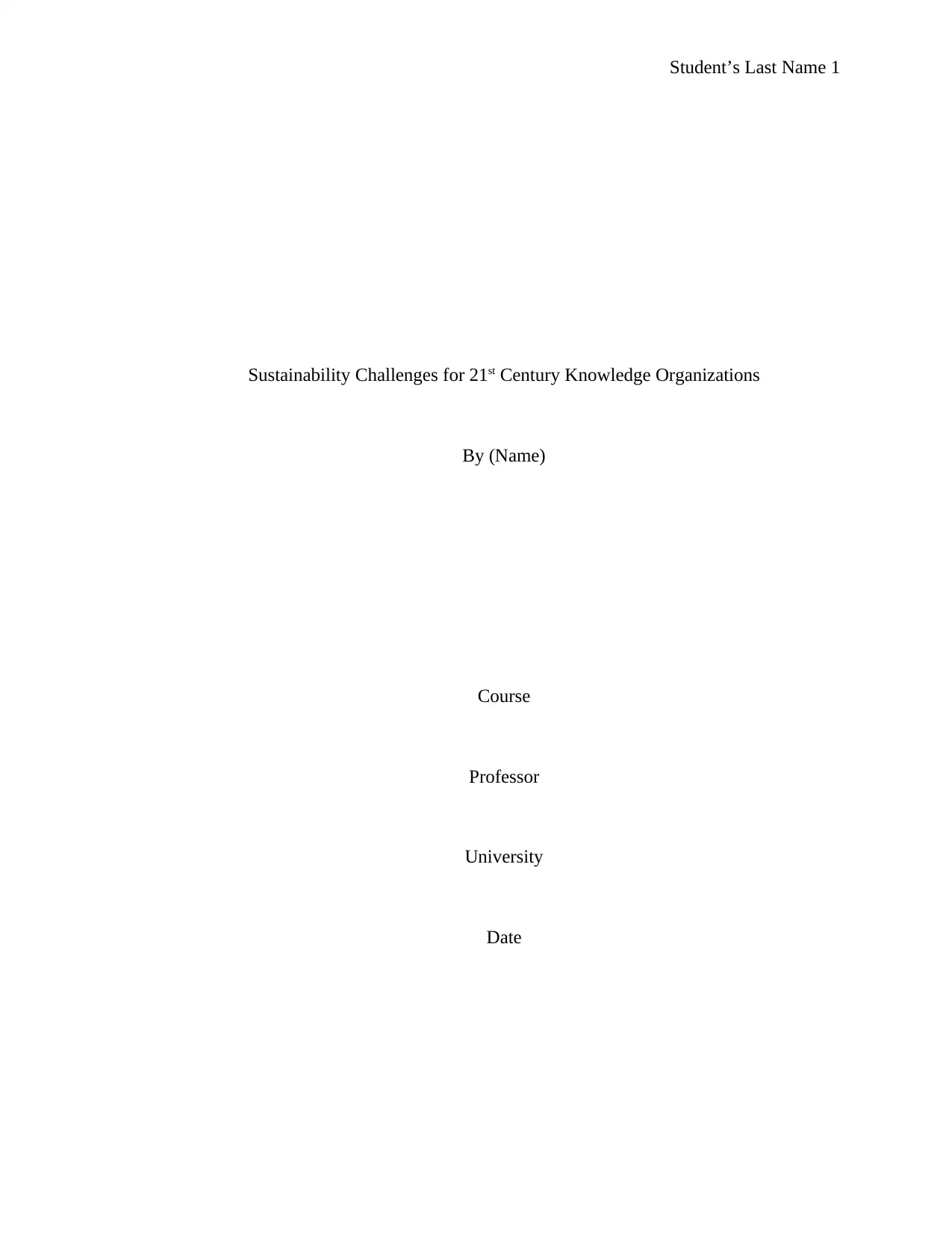
Student’s Last Name 1
Sustainability Challenges for 21st Century Knowledge Organizations
By (Name)
Course
Professor
University
Date
Sustainability Challenges for 21st Century Knowledge Organizations
By (Name)
Course
Professor
University
Date
Paraphrase This Document
Need a fresh take? Get an instant paraphrase of this document with our AI Paraphraser
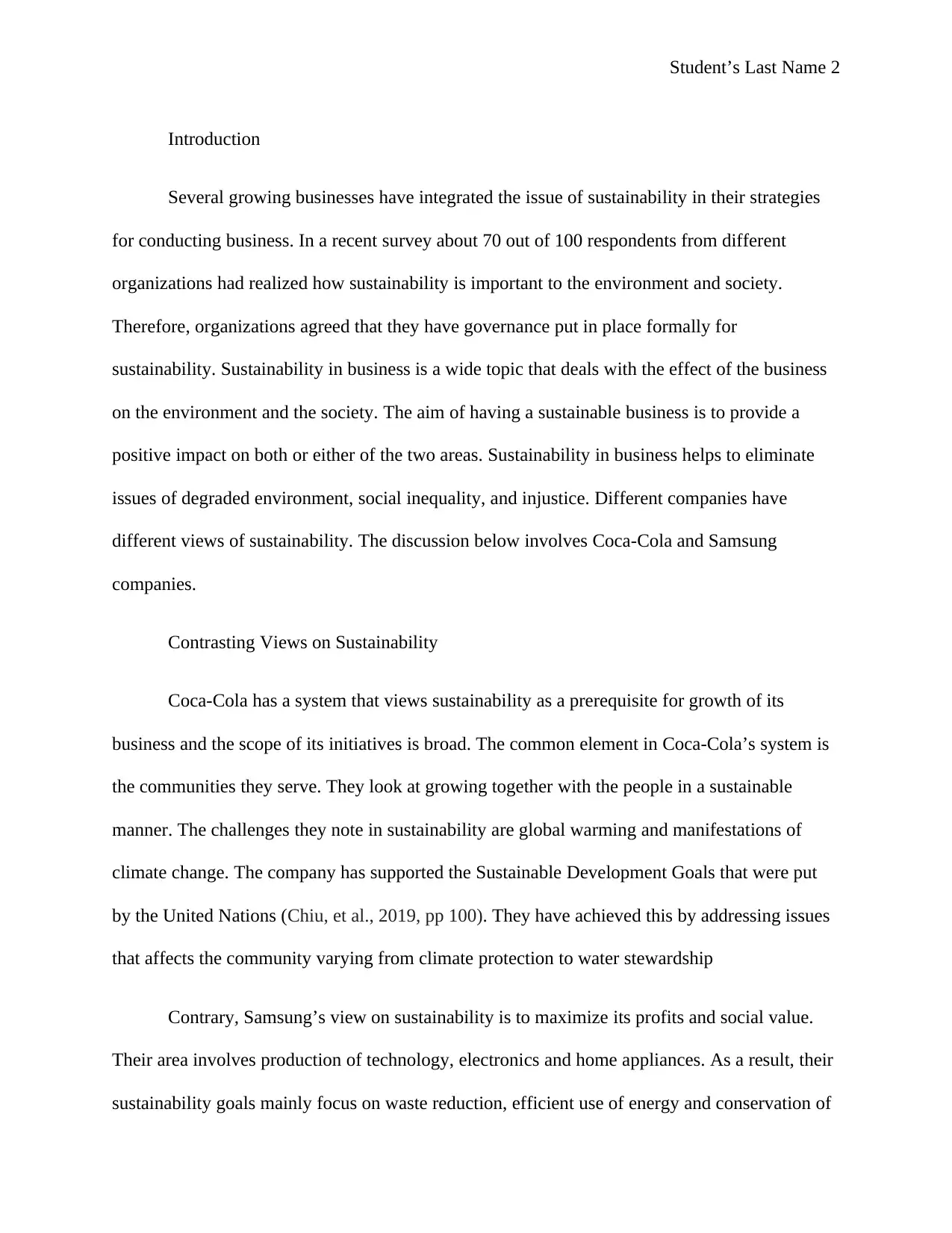
Student’s Last Name 2
Introduction
Several growing businesses have integrated the issue of sustainability in their strategies
for conducting business. In a recent survey about 70 out of 100 respondents from different
organizations had realized how sustainability is important to the environment and society.
Therefore, organizations agreed that they have governance put in place formally for
sustainability. Sustainability in business is a wide topic that deals with the effect of the business
on the environment and the society. The aim of having a sustainable business is to provide a
positive impact on both or either of the two areas. Sustainability in business helps to eliminate
issues of degraded environment, social inequality, and injustice. Different companies have
different views of sustainability. The discussion below involves Coca-Cola and Samsung
companies.
Contrasting Views on Sustainability
Coca-Cola has a system that views sustainability as a prerequisite for growth of its
business and the scope of its initiatives is broad. The common element in Coca-Cola’s system is
the communities they serve. They look at growing together with the people in a sustainable
manner. The challenges they note in sustainability are global warming and manifestations of
climate change. The company has supported the Sustainable Development Goals that were put
by the United Nations (Chiu, et al., 2019, pp 100). They have achieved this by addressing issues
that affects the community varying from climate protection to water stewardship
Contrary, Samsung’s view on sustainability is to maximize its profits and social value.
Their area involves production of technology, electronics and home appliances. As a result, their
sustainability goals mainly focus on waste reduction, efficient use of energy and conservation of
Introduction
Several growing businesses have integrated the issue of sustainability in their strategies
for conducting business. In a recent survey about 70 out of 100 respondents from different
organizations had realized how sustainability is important to the environment and society.
Therefore, organizations agreed that they have governance put in place formally for
sustainability. Sustainability in business is a wide topic that deals with the effect of the business
on the environment and the society. The aim of having a sustainable business is to provide a
positive impact on both or either of the two areas. Sustainability in business helps to eliminate
issues of degraded environment, social inequality, and injustice. Different companies have
different views of sustainability. The discussion below involves Coca-Cola and Samsung
companies.
Contrasting Views on Sustainability
Coca-Cola has a system that views sustainability as a prerequisite for growth of its
business and the scope of its initiatives is broad. The common element in Coca-Cola’s system is
the communities they serve. They look at growing together with the people in a sustainable
manner. The challenges they note in sustainability are global warming and manifestations of
climate change. The company has supported the Sustainable Development Goals that were put
by the United Nations (Chiu, et al., 2019, pp 100). They have achieved this by addressing issues
that affects the community varying from climate protection to water stewardship
Contrary, Samsung’s view on sustainability is to maximize its profits and social value.
Their area involves production of technology, electronics and home appliances. As a result, their
sustainability goals mainly focus on waste reduction, efficient use of energy and conservation of
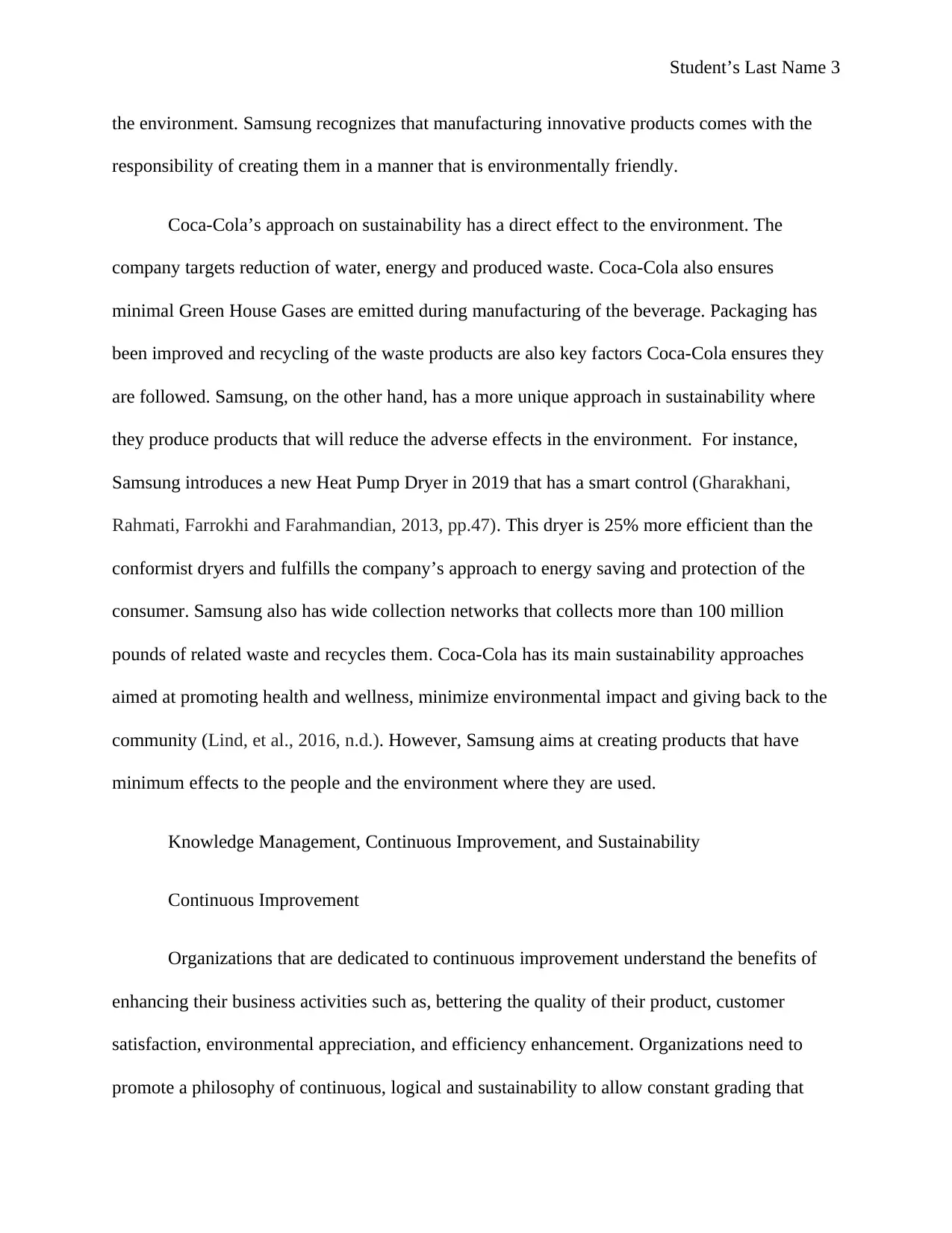
Student’s Last Name 3
the environment. Samsung recognizes that manufacturing innovative products comes with the
responsibility of creating them in a manner that is environmentally friendly.
Coca-Cola’s approach on sustainability has a direct effect to the environment. The
company targets reduction of water, energy and produced waste. Coca-Cola also ensures
minimal Green House Gases are emitted during manufacturing of the beverage. Packaging has
been improved and recycling of the waste products are also key factors Coca-Cola ensures they
are followed. Samsung, on the other hand, has a more unique approach in sustainability where
they produce products that will reduce the adverse effects in the environment. For instance,
Samsung introduces a new Heat Pump Dryer in 2019 that has a smart control (Gharakhani,
Rahmati, Farrokhi and Farahmandian, 2013, pp.47). This dryer is 25% more efficient than the
conformist dryers and fulfills the company’s approach to energy saving and protection of the
consumer. Samsung also has wide collection networks that collects more than 100 million
pounds of related waste and recycles them. Coca-Cola has its main sustainability approaches
aimed at promoting health and wellness, minimize environmental impact and giving back to the
community (Lind, et al., 2016, n.d.). However, Samsung aims at creating products that have
minimum effects to the people and the environment where they are used.
Knowledge Management, Continuous Improvement, and Sustainability
Continuous Improvement
Organizations that are dedicated to continuous improvement understand the benefits of
enhancing their business activities such as, bettering the quality of their product, customer
satisfaction, environmental appreciation, and efficiency enhancement. Organizations need to
promote a philosophy of continuous, logical and sustainability to allow constant grading that
the environment. Samsung recognizes that manufacturing innovative products comes with the
responsibility of creating them in a manner that is environmentally friendly.
Coca-Cola’s approach on sustainability has a direct effect to the environment. The
company targets reduction of water, energy and produced waste. Coca-Cola also ensures
minimal Green House Gases are emitted during manufacturing of the beverage. Packaging has
been improved and recycling of the waste products are also key factors Coca-Cola ensures they
are followed. Samsung, on the other hand, has a more unique approach in sustainability where
they produce products that will reduce the adverse effects in the environment. For instance,
Samsung introduces a new Heat Pump Dryer in 2019 that has a smart control (Gharakhani,
Rahmati, Farrokhi and Farahmandian, 2013, pp.47). This dryer is 25% more efficient than the
conformist dryers and fulfills the company’s approach to energy saving and protection of the
consumer. Samsung also has wide collection networks that collects more than 100 million
pounds of related waste and recycles them. Coca-Cola has its main sustainability approaches
aimed at promoting health and wellness, minimize environmental impact and giving back to the
community (Lind, et al., 2016, n.d.). However, Samsung aims at creating products that have
minimum effects to the people and the environment where they are used.
Knowledge Management, Continuous Improvement, and Sustainability
Continuous Improvement
Organizations that are dedicated to continuous improvement understand the benefits of
enhancing their business activities such as, bettering the quality of their product, customer
satisfaction, environmental appreciation, and efficiency enhancement. Organizations need to
promote a philosophy of continuous, logical and sustainability to allow constant grading that
⊘ This is a preview!⊘
Do you want full access?
Subscribe today to unlock all pages.

Trusted by 1+ million students worldwide
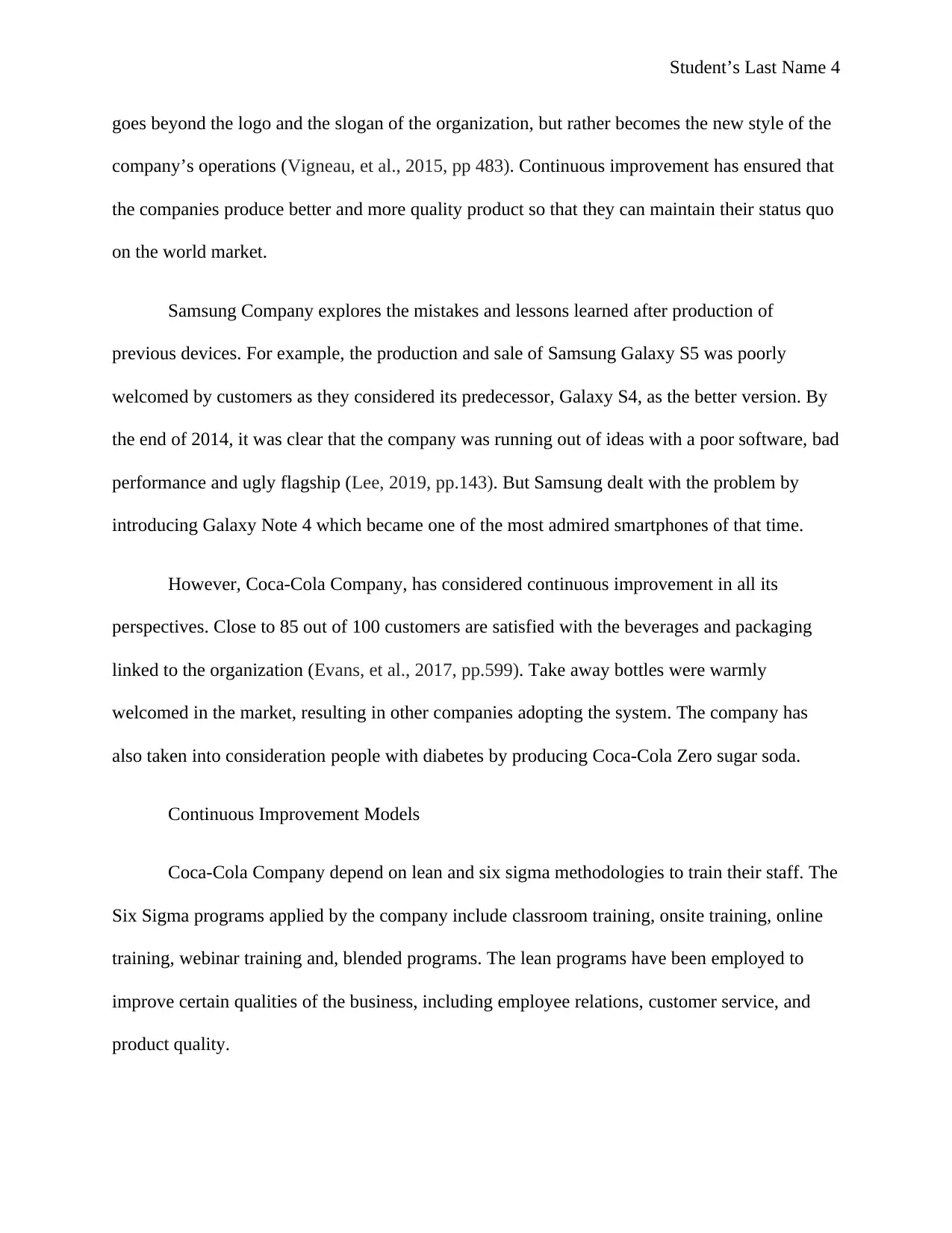
Student’s Last Name 4
goes beyond the logo and the slogan of the organization, but rather becomes the new style of the
company’s operations (Vigneau, et al., 2015, pp 483). Continuous improvement has ensured that
the companies produce better and more quality product so that they can maintain their status quo
on the world market.
Samsung Company explores the mistakes and lessons learned after production of
previous devices. For example, the production and sale of Samsung Galaxy S5 was poorly
welcomed by customers as they considered its predecessor, Galaxy S4, as the better version. By
the end of 2014, it was clear that the company was running out of ideas with a poor software, bad
performance and ugly flagship (Lee, 2019, pp.143). But Samsung dealt with the problem by
introducing Galaxy Note 4 which became one of the most admired smartphones of that time.
However, Coca-Cola Company, has considered continuous improvement in all its
perspectives. Close to 85 out of 100 customers are satisfied with the beverages and packaging
linked to the organization (Evans, et al., 2017, pp.599). Take away bottles were warmly
welcomed in the market, resulting in other companies adopting the system. The company has
also taken into consideration people with diabetes by producing Coca-Cola Zero sugar soda.
Continuous Improvement Models
Coca-Cola Company depend on lean and six sigma methodologies to train their staff. The
Six Sigma programs applied by the company include classroom training, onsite training, online
training, webinar training and, blended programs. The lean programs have been employed to
improve certain qualities of the business, including employee relations, customer service, and
product quality.
goes beyond the logo and the slogan of the organization, but rather becomes the new style of the
company’s operations (Vigneau, et al., 2015, pp 483). Continuous improvement has ensured that
the companies produce better and more quality product so that they can maintain their status quo
on the world market.
Samsung Company explores the mistakes and lessons learned after production of
previous devices. For example, the production and sale of Samsung Galaxy S5 was poorly
welcomed by customers as they considered its predecessor, Galaxy S4, as the better version. By
the end of 2014, it was clear that the company was running out of ideas with a poor software, bad
performance and ugly flagship (Lee, 2019, pp.143). But Samsung dealt with the problem by
introducing Galaxy Note 4 which became one of the most admired smartphones of that time.
However, Coca-Cola Company, has considered continuous improvement in all its
perspectives. Close to 85 out of 100 customers are satisfied with the beverages and packaging
linked to the organization (Evans, et al., 2017, pp.599). Take away bottles were warmly
welcomed in the market, resulting in other companies adopting the system. The company has
also taken into consideration people with diabetes by producing Coca-Cola Zero sugar soda.
Continuous Improvement Models
Coca-Cola Company depend on lean and six sigma methodologies to train their staff. The
Six Sigma programs applied by the company include classroom training, onsite training, online
training, webinar training and, blended programs. The lean programs have been employed to
improve certain qualities of the business, including employee relations, customer service, and
product quality.
Paraphrase This Document
Need a fresh take? Get an instant paraphrase of this document with our AI Paraphraser
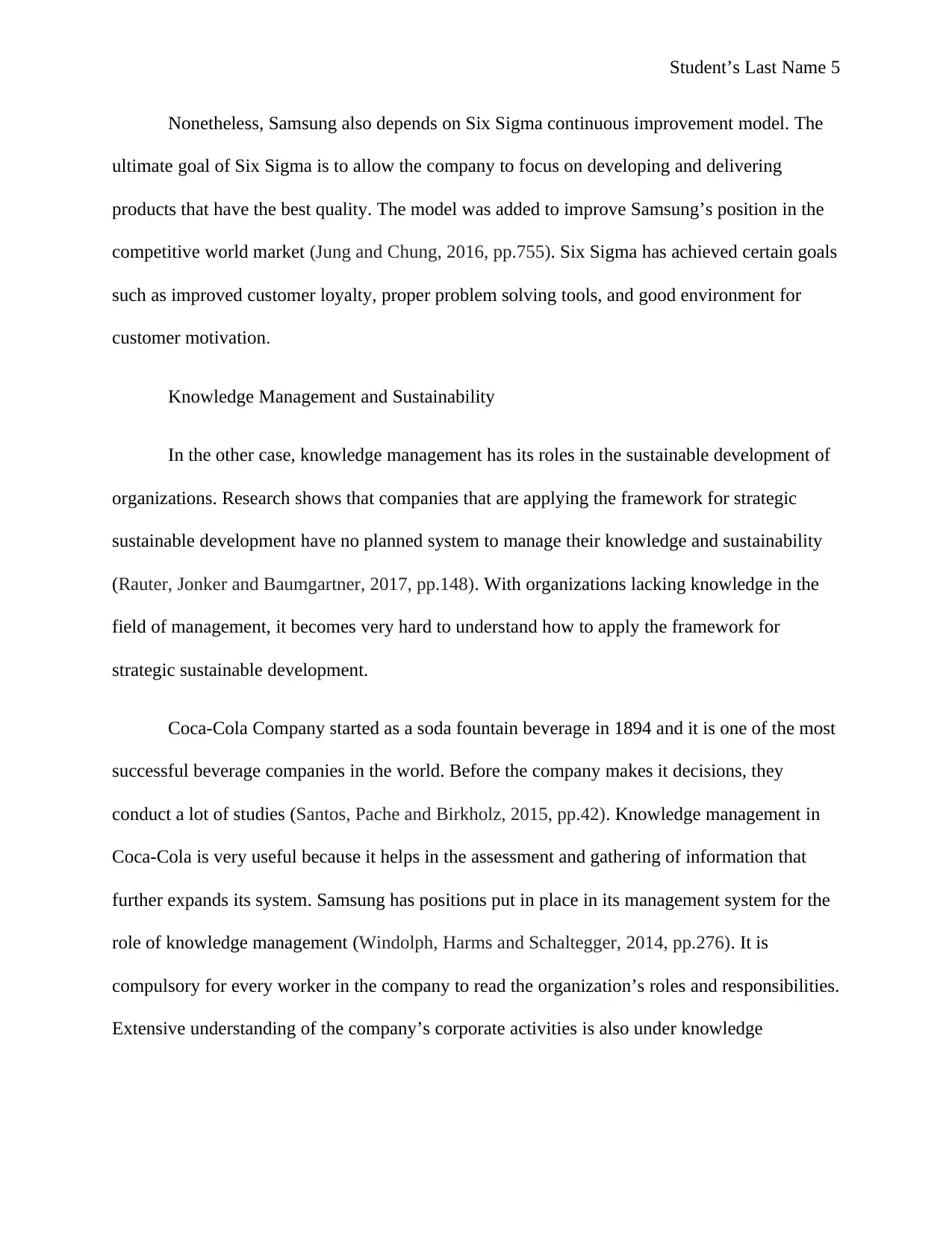
Student’s Last Name 5
Nonetheless, Samsung also depends on Six Sigma continuous improvement model. The
ultimate goal of Six Sigma is to allow the company to focus on developing and delivering
products that have the best quality. The model was added to improve Samsung’s position in the
competitive world market (Jung and Chung, 2016, pp.755). Six Sigma has achieved certain goals
such as improved customer loyalty, proper problem solving tools, and good environment for
customer motivation.
Knowledge Management and Sustainability
In the other case, knowledge management has its roles in the sustainable development of
organizations. Research shows that companies that are applying the framework for strategic
sustainable development have no planned system to manage their knowledge and sustainability
(Rauter, Jonker and Baumgartner, 2017, pp.148). With organizations lacking knowledge in the
field of management, it becomes very hard to understand how to apply the framework for
strategic sustainable development.
Coca-Cola Company started as a soda fountain beverage in 1894 and it is one of the most
successful beverage companies in the world. Before the company makes it decisions, they
conduct a lot of studies (Santos, Pache and Birkholz, 2015, pp.42). Knowledge management in
Coca-Cola is very useful because it helps in the assessment and gathering of information that
further expands its system. Samsung has positions put in place in its management system for the
role of knowledge management (Windolph, Harms and Schaltegger, 2014, pp.276). It is
compulsory for every worker in the company to read the organization’s roles and responsibilities.
Extensive understanding of the company’s corporate activities is also under knowledge
Nonetheless, Samsung also depends on Six Sigma continuous improvement model. The
ultimate goal of Six Sigma is to allow the company to focus on developing and delivering
products that have the best quality. The model was added to improve Samsung’s position in the
competitive world market (Jung and Chung, 2016, pp.755). Six Sigma has achieved certain goals
such as improved customer loyalty, proper problem solving tools, and good environment for
customer motivation.
Knowledge Management and Sustainability
In the other case, knowledge management has its roles in the sustainable development of
organizations. Research shows that companies that are applying the framework for strategic
sustainable development have no planned system to manage their knowledge and sustainability
(Rauter, Jonker and Baumgartner, 2017, pp.148). With organizations lacking knowledge in the
field of management, it becomes very hard to understand how to apply the framework for
strategic sustainable development.
Coca-Cola Company started as a soda fountain beverage in 1894 and it is one of the most
successful beverage companies in the world. Before the company makes it decisions, they
conduct a lot of studies (Santos, Pache and Birkholz, 2015, pp.42). Knowledge management in
Coca-Cola is very useful because it helps in the assessment and gathering of information that
further expands its system. Samsung has positions put in place in its management system for the
role of knowledge management (Windolph, Harms and Schaltegger, 2014, pp.276). It is
compulsory for every worker in the company to read the organization’s roles and responsibilities.
Extensive understanding of the company’s corporate activities is also under knowledge
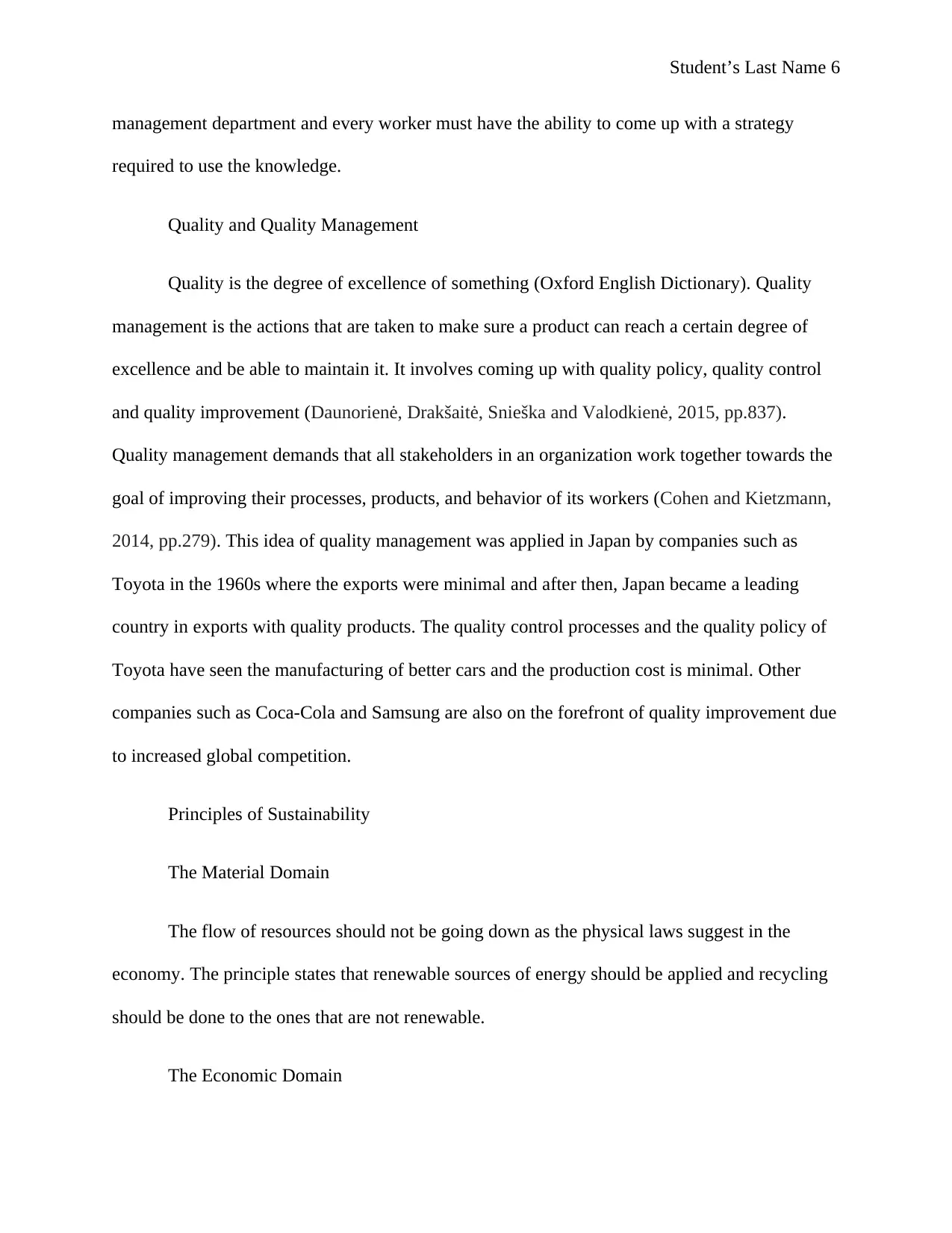
Student’s Last Name 6
management department and every worker must have the ability to come up with a strategy
required to use the knowledge.
Quality and Quality Management
Quality is the degree of excellence of something (Oxford English Dictionary). Quality
management is the actions that are taken to make sure a product can reach a certain degree of
excellence and be able to maintain it. It involves coming up with quality policy, quality control
and quality improvement (Daunorienė, Drakšaitė, Snieška and Valodkienė, 2015, pp.837).
Quality management demands that all stakeholders in an organization work together towards the
goal of improving their processes, products, and behavior of its workers (Cohen and Kietzmann,
2014, pp.279). This idea of quality management was applied in Japan by companies such as
Toyota in the 1960s where the exports were minimal and after then, Japan became a leading
country in exports with quality products. The quality control processes and the quality policy of
Toyota have seen the manufacturing of better cars and the production cost is minimal. Other
companies such as Coca-Cola and Samsung are also on the forefront of quality improvement due
to increased global competition.
Principles of Sustainability
The Material Domain
The flow of resources should not be going down as the physical laws suggest in the
economy. The principle states that renewable sources of energy should be applied and recycling
should be done to the ones that are not renewable.
The Economic Domain
management department and every worker must have the ability to come up with a strategy
required to use the knowledge.
Quality and Quality Management
Quality is the degree of excellence of something (Oxford English Dictionary). Quality
management is the actions that are taken to make sure a product can reach a certain degree of
excellence and be able to maintain it. It involves coming up with quality policy, quality control
and quality improvement (Daunorienė, Drakšaitė, Snieška and Valodkienė, 2015, pp.837).
Quality management demands that all stakeholders in an organization work together towards the
goal of improving their processes, products, and behavior of its workers (Cohen and Kietzmann,
2014, pp.279). This idea of quality management was applied in Japan by companies such as
Toyota in the 1960s where the exports were minimal and after then, Japan became a leading
country in exports with quality products. The quality control processes and the quality policy of
Toyota have seen the manufacturing of better cars and the production cost is minimal. Other
companies such as Coca-Cola and Samsung are also on the forefront of quality improvement due
to increased global competition.
Principles of Sustainability
The Material Domain
The flow of resources should not be going down as the physical laws suggest in the
economy. The principle states that renewable sources of energy should be applied and recycling
should be done to the ones that are not renewable.
The Economic Domain
⊘ This is a preview!⊘
Do you want full access?
Subscribe today to unlock all pages.

Trusted by 1+ million students worldwide
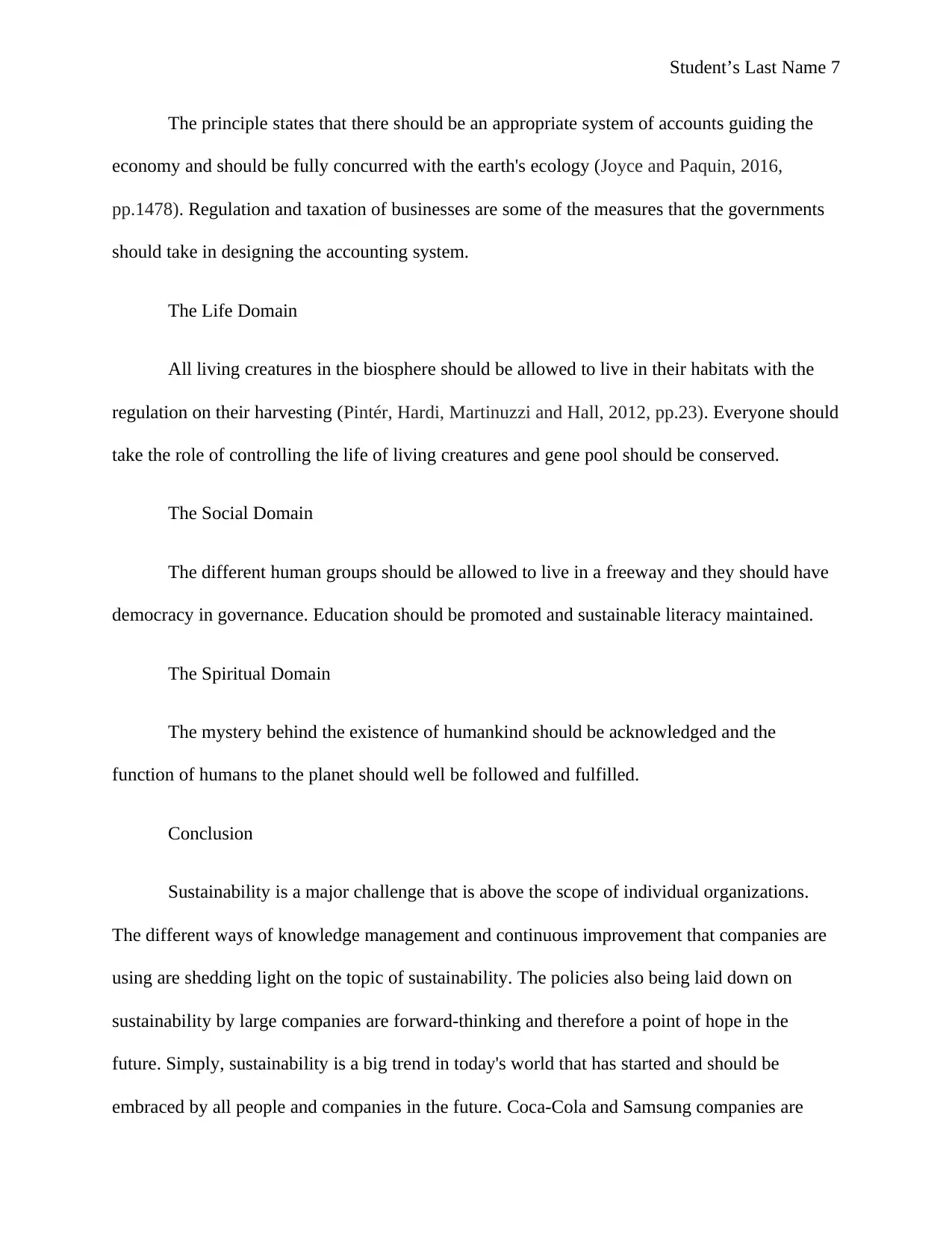
Student’s Last Name 7
The principle states that there should be an appropriate system of accounts guiding the
economy and should be fully concurred with the earth's ecology (Joyce and Paquin, 2016,
pp.1478). Regulation and taxation of businesses are some of the measures that the governments
should take in designing the accounting system.
The Life Domain
All living creatures in the biosphere should be allowed to live in their habitats with the
regulation on their harvesting (Pintér, Hardi, Martinuzzi and Hall, 2012, pp.23). Everyone should
take the role of controlling the life of living creatures and gene pool should be conserved.
The Social Domain
The different human groups should be allowed to live in a freeway and they should have
democracy in governance. Education should be promoted and sustainable literacy maintained.
The Spiritual Domain
The mystery behind the existence of humankind should be acknowledged and the
function of humans to the planet should well be followed and fulfilled.
Conclusion
Sustainability is a major challenge that is above the scope of individual organizations.
The different ways of knowledge management and continuous improvement that companies are
using are shedding light on the topic of sustainability. The policies also being laid down on
sustainability by large companies are forward-thinking and therefore a point of hope in the
future. Simply, sustainability is a big trend in today's world that has started and should be
embraced by all people and companies in the future. Coca-Cola and Samsung companies are
The principle states that there should be an appropriate system of accounts guiding the
economy and should be fully concurred with the earth's ecology (Joyce and Paquin, 2016,
pp.1478). Regulation and taxation of businesses are some of the measures that the governments
should take in designing the accounting system.
The Life Domain
All living creatures in the biosphere should be allowed to live in their habitats with the
regulation on their harvesting (Pintér, Hardi, Martinuzzi and Hall, 2012, pp.23). Everyone should
take the role of controlling the life of living creatures and gene pool should be conserved.
The Social Domain
The different human groups should be allowed to live in a freeway and they should have
democracy in governance. Education should be promoted and sustainable literacy maintained.
The Spiritual Domain
The mystery behind the existence of humankind should be acknowledged and the
function of humans to the planet should well be followed and fulfilled.
Conclusion
Sustainability is a major challenge that is above the scope of individual organizations.
The different ways of knowledge management and continuous improvement that companies are
using are shedding light on the topic of sustainability. The policies also being laid down on
sustainability by large companies are forward-thinking and therefore a point of hope in the
future. Simply, sustainability is a big trend in today's world that has started and should be
embraced by all people and companies in the future. Coca-Cola and Samsung companies are
Paraphrase This Document
Need a fresh take? Get an instant paraphrase of this document with our AI Paraphraser
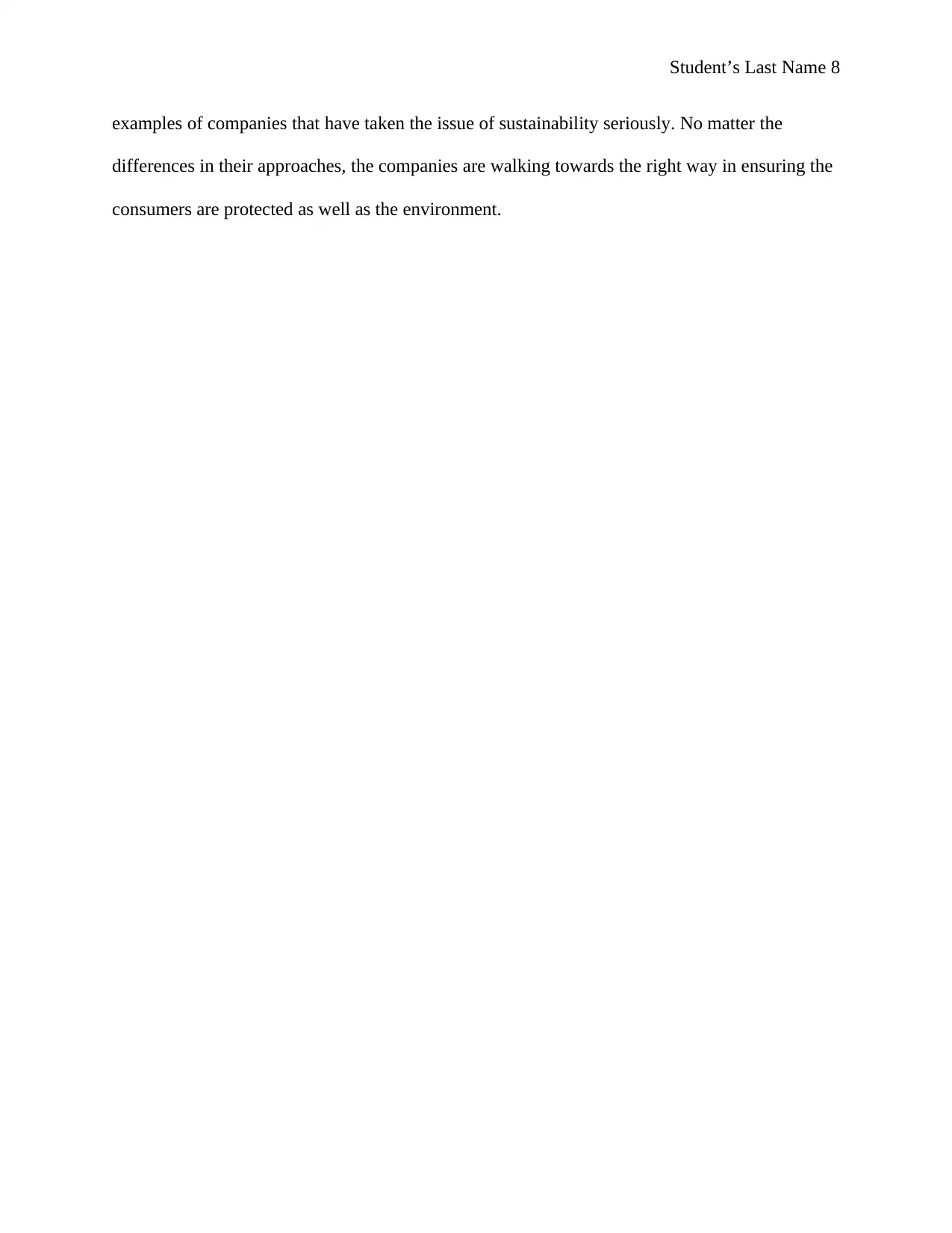
Student’s Last Name 8
examples of companies that have taken the issue of sustainability seriously. No matter the
differences in their approaches, the companies are walking towards the right way in ensuring the
consumers are protected as well as the environment.
examples of companies that have taken the issue of sustainability seriously. No matter the
differences in their approaches, the companies are walking towards the right way in ensuring the
consumers are protected as well as the environment.
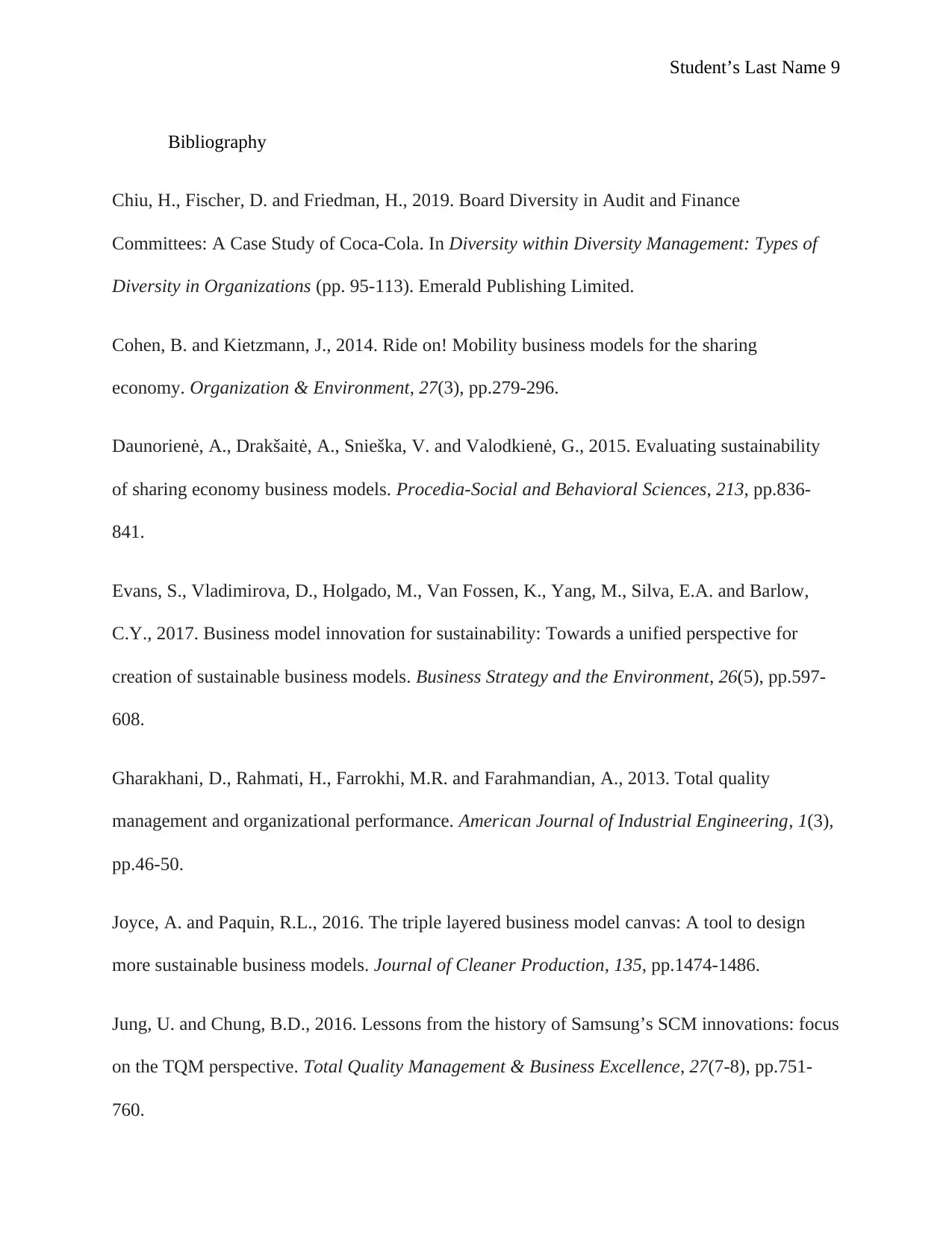
Student’s Last Name 9
Bibliography
Chiu, H., Fischer, D. and Friedman, H., 2019. Board Diversity in Audit and Finance
Committees: A Case Study of Coca-Cola. In Diversity within Diversity Management: Types of
Diversity in Organizations (pp. 95-113). Emerald Publishing Limited.
Cohen, B. and Kietzmann, J., 2014. Ride on! Mobility business models for the sharing
economy. Organization & Environment, 27(3), pp.279-296.
Daunorienė, A., Drakšaitė, A., Snieška, V. and Valodkienė, G., 2015. Evaluating sustainability
of sharing economy business models. Procedia-Social and Behavioral Sciences, 213, pp.836-
841.
Evans, S., Vladimirova, D., Holgado, M., Van Fossen, K., Yang, M., Silva, E.A. and Barlow,
C.Y., 2017. Business model innovation for sustainability: Towards a unified perspective for
creation of sustainable business models. Business Strategy and the Environment, 26(5), pp.597-
608.
Gharakhani, D., Rahmati, H., Farrokhi, M.R. and Farahmandian, A., 2013. Total quality
management and organizational performance. American Journal of Industrial Engineering, 1(3),
pp.46-50.
Joyce, A. and Paquin, R.L., 2016. The triple layered business model canvas: A tool to design
more sustainable business models. Journal of Cleaner Production, 135, pp.1474-1486.
Jung, U. and Chung, B.D., 2016. Lessons from the history of Samsung’s SCM innovations: focus
on the TQM perspective. Total Quality Management & Business Excellence, 27(7-8), pp.751-
760.
Bibliography
Chiu, H., Fischer, D. and Friedman, H., 2019. Board Diversity in Audit and Finance
Committees: A Case Study of Coca-Cola. In Diversity within Diversity Management: Types of
Diversity in Organizations (pp. 95-113). Emerald Publishing Limited.
Cohen, B. and Kietzmann, J., 2014. Ride on! Mobility business models for the sharing
economy. Organization & Environment, 27(3), pp.279-296.
Daunorienė, A., Drakšaitė, A., Snieška, V. and Valodkienė, G., 2015. Evaluating sustainability
of sharing economy business models. Procedia-Social and Behavioral Sciences, 213, pp.836-
841.
Evans, S., Vladimirova, D., Holgado, M., Van Fossen, K., Yang, M., Silva, E.A. and Barlow,
C.Y., 2017. Business model innovation for sustainability: Towards a unified perspective for
creation of sustainable business models. Business Strategy and the Environment, 26(5), pp.597-
608.
Gharakhani, D., Rahmati, H., Farrokhi, M.R. and Farahmandian, A., 2013. Total quality
management and organizational performance. American Journal of Industrial Engineering, 1(3),
pp.46-50.
Joyce, A. and Paquin, R.L., 2016. The triple layered business model canvas: A tool to design
more sustainable business models. Journal of Cleaner Production, 135, pp.1474-1486.
Jung, U. and Chung, B.D., 2016. Lessons from the history of Samsung’s SCM innovations: focus
on the TQM perspective. Total Quality Management & Business Excellence, 27(7-8), pp.751-
760.
⊘ This is a preview!⊘
Do you want full access?
Subscribe today to unlock all pages.

Trusted by 1+ million students worldwide
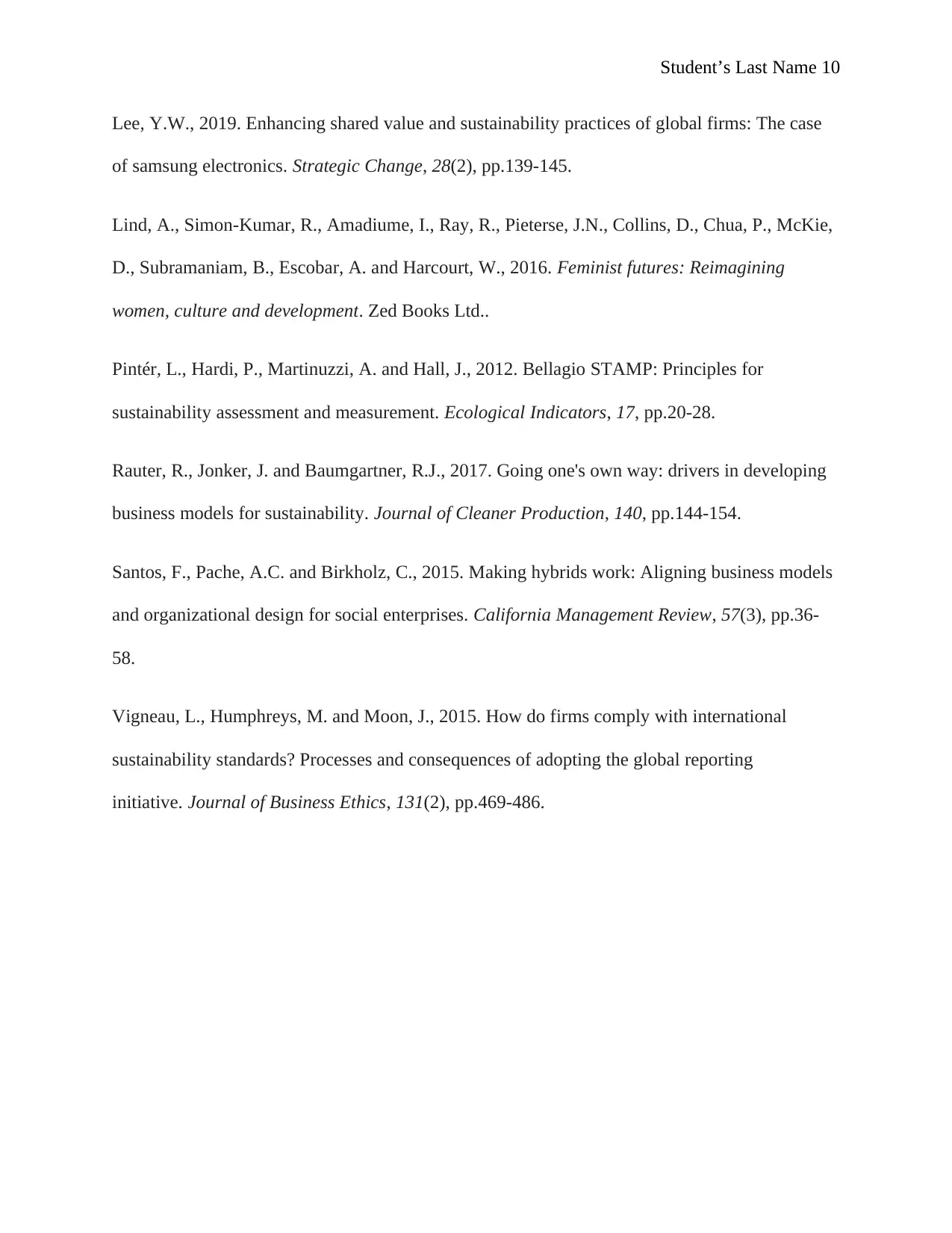
Student’s Last Name 10
Lee, Y.W., 2019. Enhancing shared value and sustainability practices of global firms: The case
of samsung electronics. Strategic Change, 28(2), pp.139-145.
Lind, A., Simon-Kumar, R., Amadiume, I., Ray, R., Pieterse, J.N., Collins, D., Chua, P., McKie,
D., Subramaniam, B., Escobar, A. and Harcourt, W., 2016. Feminist futures: Reimagining
women, culture and development. Zed Books Ltd..
Pintér, L., Hardi, P., Martinuzzi, A. and Hall, J., 2012. Bellagio STAMP: Principles for
sustainability assessment and measurement. Ecological Indicators, 17, pp.20-28.
Rauter, R., Jonker, J. and Baumgartner, R.J., 2017. Going one's own way: drivers in developing
business models for sustainability. Journal of Cleaner Production, 140, pp.144-154.
Santos, F., Pache, A.C. and Birkholz, C., 2015. Making hybrids work: Aligning business models
and organizational design for social enterprises. California Management Review, 57(3), pp.36-
58.
Vigneau, L., Humphreys, M. and Moon, J., 2015. How do firms comply with international
sustainability standards? Processes and consequences of adopting the global reporting
initiative. Journal of Business Ethics, 131(2), pp.469-486.
Lee, Y.W., 2019. Enhancing shared value and sustainability practices of global firms: The case
of samsung electronics. Strategic Change, 28(2), pp.139-145.
Lind, A., Simon-Kumar, R., Amadiume, I., Ray, R., Pieterse, J.N., Collins, D., Chua, P., McKie,
D., Subramaniam, B., Escobar, A. and Harcourt, W., 2016. Feminist futures: Reimagining
women, culture and development. Zed Books Ltd..
Pintér, L., Hardi, P., Martinuzzi, A. and Hall, J., 2012. Bellagio STAMP: Principles for
sustainability assessment and measurement. Ecological Indicators, 17, pp.20-28.
Rauter, R., Jonker, J. and Baumgartner, R.J., 2017. Going one's own way: drivers in developing
business models for sustainability. Journal of Cleaner Production, 140, pp.144-154.
Santos, F., Pache, A.C. and Birkholz, C., 2015. Making hybrids work: Aligning business models
and organizational design for social enterprises. California Management Review, 57(3), pp.36-
58.
Vigneau, L., Humphreys, M. and Moon, J., 2015. How do firms comply with international
sustainability standards? Processes and consequences of adopting the global reporting
initiative. Journal of Business Ethics, 131(2), pp.469-486.
1 out of 10
Related Documents
Your All-in-One AI-Powered Toolkit for Academic Success.
+13062052269
info@desklib.com
Available 24*7 on WhatsApp / Email
![[object Object]](/_next/static/media/star-bottom.7253800d.svg)
Unlock your academic potential
Copyright © 2020–2026 A2Z Services. All Rights Reserved. Developed and managed by ZUCOL.





